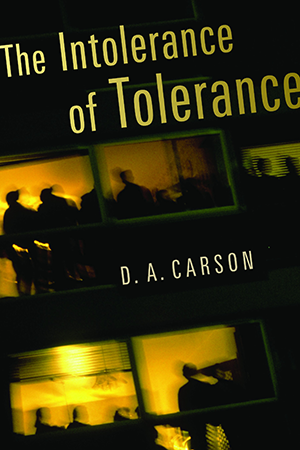 Review of The Intolerance of Tolerance by Don Carson
Review of The Intolerance of Tolerance by Don Carson
Are Christians, by definition, intolerant? Increasingly our society believes we are. Christian beliefs are regarded as intolerant, and Christians are regarded as intolerant for speaking them. Corresponding to that, there is a growing insistence that Christian beliefs have no place in public discussion. That is, Christian beliefs shouldn’t be tolerated in modern society.
In The Intolerance of Tolerance, Don Carson argues that our society’s definition of tolerance has dramatically shifted, and that that is a bad thing. The purpose of the book is to contrast what Carson calls the “old tolerance” with the “new tolerance”.
Contrary to what that might sound like, this is not an academic issue of interest merely to a select few. Though primarily reflecting on an American context, this issue is central to the way modern Australian society views Christianity too. If we want to compellingly present the gospel of Jesus to a society increasingly convinced that we are intolerant, it will be essential to think through the issues Carson raises here.
At its core, the difference between the old tolerance and the new tolerance is a disagreement about the nature of truth. The old tolerance was based on the idea that there is such a thing as truth, and that contrary views to the truth are untrue. On this view tolerance involves (a) disagreeing with someone else’s view, and (b) defending the right of that person to continue to hold that view, even though you regard it as untrue or immoral, and will try to convince them to change their view. The old tolerance is well summed up in the old saying “I disapprove of what you say, but I will defend to the death your right to say it.”
The old tolerance was the basis upon which reasoned debate could occur. It meant that you allowed views you disagreed with to exist and have their say, without being coerced or silenced. After all, allowing all viewpoints to be openly stated and considered is the best way to weigh up what’s true, and to try to convince others of your views in a peaceful, non-coercive fashion.
In contrast, the new tolerance is based on the idea there isn’t ultimately such a thing as truth. It therefore insists that all views and lifestyles are equally valid. But this undermines the right to disagree, the very basis of the old tolerance! Under the new tolerance: (a) disagreement is not allowed, and therefore (b) any view that doesn’t fit with the new tolerance is not to be tolerated.
And then there’s the sinister side of the new tolerance. It insists that we accept all views as equally valid, and don’t tolerate those who won’t. The new tolerance is essentially compulsory relativism. It is intolerant of any non-relativistic viewpoints. For example, Carson points out that from the perspective of secular media the church’s ultimate sin is to do or say anything that implies that other peoples’ beliefs are wrong. Both inside and outside the church the new tolerance gives pressure to dilute Christian beliefs and minimise disagreement.
Carson argues that in societies like Australia, the new tolerance dominates our social and ethical worldview. It is a foundational belief in our society: an absolute, sacred truth not to be trespassed. Carson identifies it as part of our “plausibility structure”. That is, it is a belief so basic to our society that it is beyond questioning, and the basis upon which other beliefs are judged.
And there’s the challenge for communicating the gospel today: Jesus is opposed to the new tolerance. The two can’t coexist. What that means is that the faithful expression of the Christian gospel or worldview will not be tolerated in public discussion. It will be silenced and refused consideration, all (ironically) in the name of “tolerance”. At a more personal level, the exclusive claims of Jesus (e.g. John 14:6) will likely be the reason your non-Christian friends think your beliefs are intolerant, and therefore not worth considering. That is the intolerance of tolerance, and it’s the challenge we must be prepared to engage with.
Carson’s book is worth careful reading and reflection. I found his argument clear and compelling. His historical narrative helpfully explained the way tolerance has changed, and his broad range of contemporary case studies (from business, education, medicine, media, government, religion, etc) demonstrated convincingly that the new tolerance is actually intolerant and even harmful, not to mention self-contradictory and incoherent. The book ends with ten areas for Christians to reflect on practically.
This book is not for an academic audience, but neither is it easy going. I believe that it is accessible for most Christians, but it may take some effort. Considering the importance of these issues, church pastors ought to familiarise themselves with Carson’s argument and train their congregations to think through how these issues impact the way they communicate the gospel today.
Matthew Payne is Associate Pastor at NewLife Anglican Church, a new church plant in Oran Park, in south-west Sydney.
Did you like this book review? Check out our other recent reviews to find the next book on your reading list >>
Email This Story
Why not send this to a friend?


